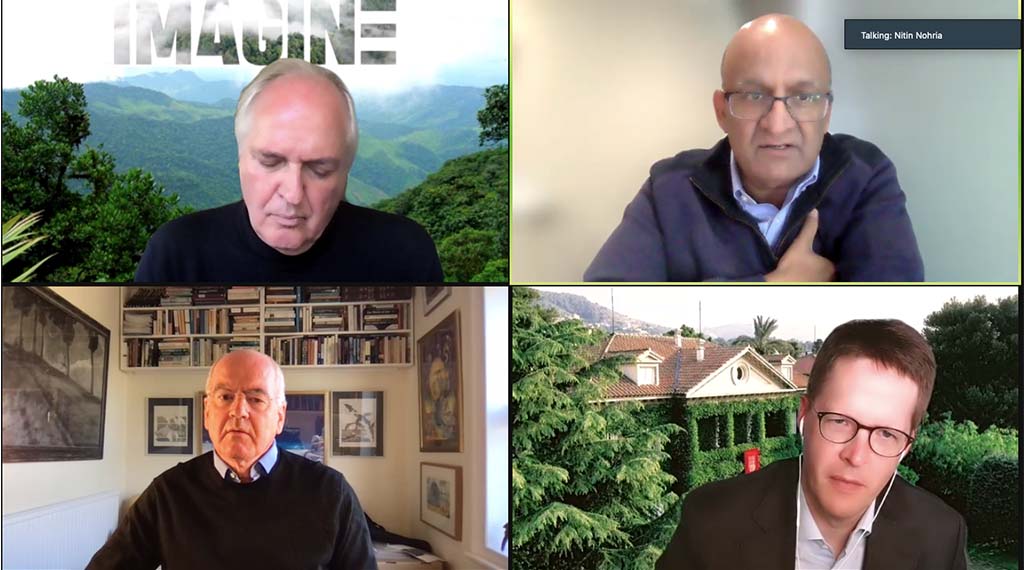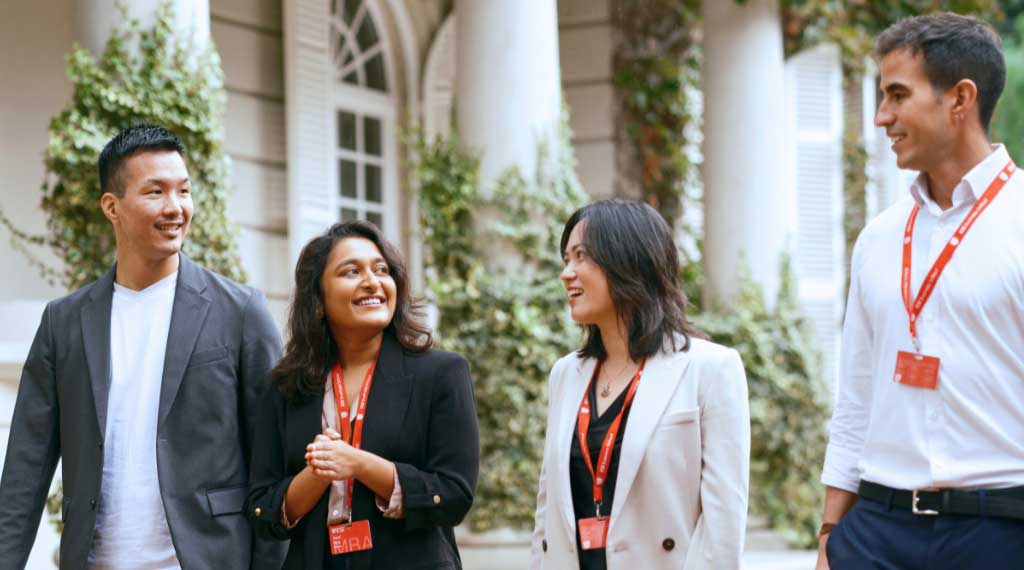Stories
“Creating business leaders the world needs”
IESE and Shizenkan's MBA Future of Capitalism course closes with former Unilever CEO Paul Polman
Paul Polman, Nitin Nohria, Franz Heukamp and John Elkington (clockwise from top) spoke during the closing session of The Future of Capitalism MBA course.
April 27, 2021

The first edition of IESE and Shizenkan University‘s MBA course on the future of capitalism came to a close last week, in a special session where students presented their vision of how business can have a more positive impact on the world.
During the course, students received input from a group of prominent business leaders and CEOs who are supporting the initiative, including:
- Paul Polman, Co-founder and Chair of Imagine, Honorary Chair of International Chamber of Commerce and former CEO of Unilever
- Tak Niinami, CEO of Suntory Holdings
- James Higa, Executive Director of Philanthropic Ventures Foundation and former Senior Director of Office of the CEO at Apple
- B. Muthuraman, former Vice Chairman of Tata Steel and Chairman of Tata International
- John Elkington, Founder and Chief Pollinator of Volans
- Nitin Nohria, professor and former dean of Harvard Business School.
There’s “a need to bend the curve of capitalism to make it more sustainable, more inclusive and more functional for the generations to come,” Paul Polman said during the final session’s keynote address.
He also stressed the importance of creating leaders who can drive this change in business, highlighting how the Future of Capitalism MBA course can help lead the way. “We certainly need more business school programs that create the business leaders the world needs, so I commend this program for doing that.” He particularly praised the global nature of the program, which involves collaborating with schools from Brazil, India, Japan and Spain. “We cannot tackle these big issues alone, so having these broader partnerships in the academic world is key.”
A global MBA project for social change
The Future of Capitalism is an MBA course that is designed to help students critically observe the current state of capitalism and explore the roles of business leadership required to create a better future.
The course was developed by IESE and Japan’s Shizenkan University, in cooperation with the School of Inspired Leadership (SOIL), India, and Fundação Getulio Vargas (FGV), Brazil. Launched in January 2021, the course is open to MBA students from all four schools. In total, 81 students of 22 different nationalities took part in the course.
Over the last three months, the MBA students have engaged in virtual conversations with a variety of guest speakers from around the world, including Mark Thompson, former CEO of New York Times; Jennifer Morgan, Executive Director of Greenpeace International; former child soldiers in Uganda; and formerly homeless children in Bangladesh, among others.
In the final session of the course, two finalist student groups presented their vision for how capitalism can become more inclusive. The first group to present explained the problem of adequately defining capitalism. They also highlighted how one of the issues with the current system is that “while we may have greater wealth creation, we also have greater inequality.” They attribute this to the widespread use of return on investment (ROI) instead of value creation as the main way to assess performance, which can ultimately end up destroying value. For them, the single biggest issue with the current system is “the shift from value creation to money creation.”
The second group of students focused on how to encourage an even balance between promoting economic improvement and social well-being. Among their proposals, they looked at the need for business to think more long-term, explored changes in how to incentivize CEOs, and also emphasized the importance of collaboration.
Muthuraman praised the “brilliant presentations” and how they highlighted the importance of looking at the system as a whole, measuring performance in a proper and holistic way, and understanding the importance of balancing competing needs. He concluded by reminding the participants to make sure they apply the learnings from the course to their own lives, because “we need more advocacy.”
Business leaders on the future of education
The final session also included a high-level panel discussion among five business supporters of the course and IESE Dean Franz Heukamp. One of the topics explored how education needs to change to have a more positive impact on society.
Polman highlighted the key role responsible business leadership must play in tackling climate change and inequality, and the crucial part business schools can play in that.
“We need the willpower of our leadership. Sixty percent of climate change solutions are available to us now. We need to use them. We also need a new economic narrative.” To do that, “we need to create leaders who are good human beings with empathy and compassion. Never has the role of business schools been more important.”
John Elkington said that, “the future generations are being massively disadvantaged by our current actions and non-actions.” He added that, “we can’t just simply say to younger people that we will educate you so you can help with this. This is a pan-generational issue. We also need to re-educate the older generation” who have the experience, connections and perhaps time to do something about it.
James Higa talked about how the style of leadership has changed in his lifetime, and education needs to reflect this. “Being a CEO or leader is not done anymore within the confines of four walls and at the head of a conference room table. How do you help leaders bring this sense of collaboration and working with outside groups into being?”
He added that the new generation of leaders need to know how to lead in online settings, and have the ability to listen, empathise, persuade and build trust with disparate people.
For his part, Nitin Nohria, former dean of Harvard Business School, pointed out how business schools are now over 100 years old, so what they need to focus on now also has to change. He said the values of this generation are in the right place, the issue is now for business schools to understand how to arm students with a body of knowledge that can equip them to better translate these values into businesses.
To conclude the session, Tomo Noda, Professor and Chair of the Board of Trustees at Shizenkan University, reiterated that the aim of the Future of Capitalism is to be “not only a course but a project for social change.”
The next edition of the Future of Capitalism will take place in 2022, with the aim of opening up the course to more participating schools thus increasing its impact. The objective is to convert the course into a platform where around 300 students from 30 schools can join for the 2024 edition.


